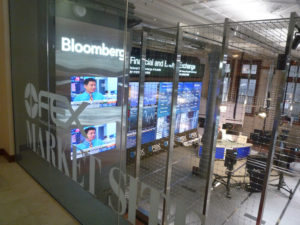The world’s largest exchanges group, the Chicago Mercantile Exchange (CME), is poised to begin operating in Australia’s financial markets via a deal with emerging futures exchange FEX Global.
Sydney-based FEX has been working for eight years to get an opportunity to compete in Australia’s markets and sources close to CME confirmed the requisite regulatory approvals were imminent; chiefly, clearance from the Reserve Bank, Treasury and the Australian Securities & Investments Commission.
This represents the first challenge to the monopoly of the Australian Securities Exchange (ASX) in “clearing”, that is, in providing the financial backing and infrastructure to execute market transactions. And although the entry of CME may present a nuisance to the ASX hegemony, at this point there is not a large crossover in futures products offered by both groups.
ASX is focussed on interest rate futures and FEX on energy and commodity futures.
Moving from a monopoly to a duopoly in clearing may help to “de-risk” Australia’s financial system. Two players, rather than one, in derivatives hedging would be better to compete in the Asia-Pacific time zone with rival exchanges in Singapore and Hong Kong.
FEX and CME will not offer equities. There are now three players in equities as financial regulators allowed Chi-X to enter the market to provide an alternate trading platform to the ASX and the boutique NSX in 2011. The move, although resisted for some time by established market forces, has been a boon for customers as ASX had used its monopoly to ratchet up fees.
Presently, ASX clears all exchange-traded equities and derivatives transactions in Australia. It is also the principal market for fixed income securities in Australia: that is, bonds and so forth.
The risk of the monopoly – both in terms of financial security and technology – is that there is a single point of failure.
Any time ASX experiences a systems failure, the entire Australian market grinds to a halt until it’s resolved. Besides the technical risk, there is also the spectre of financial stress, something the ASX has guarded against by keeping its debt low and its acquisitions few.
In any case, the entry of CME into the Australian market ought to reduce these risks for derivatives clearing.
The CME group is the largest exchange group in the world with a market capitalisation of $93 billion. It has four exchanges – CBOT (Chicago Board of Trade), Nymex, COMEX and CME, and also owns the Dow Jones indices. ICE is second largest exchange group. It owns New York Stock Exchange and ICE futures markets.
A spokesman for the ASX said:
“ASX has shown itself to be resourceful and innovative, and already competes across most of its businesses. We are not afraid of competition. ASX has a strong derivatives franchise and we are focused on continuing to do the best job we can for our customers”.
FEX executive director, Brian Price, was unavailable for comment.
Public support is vital so this website can continue to fund investigations and publish stories which speak truth to power. Please subscribe for the free newsletter, share stories on social media and, if you can afford it, tip in $5 a month.
Michael West established Michael West Media in 2016 to focus on journalism of high public interest, particularly the rising power of corporations over democracy. West was formerly a journalist and editor with Fairfax newspapers, a columnist for News Corp and even, once, a stockbroker.


